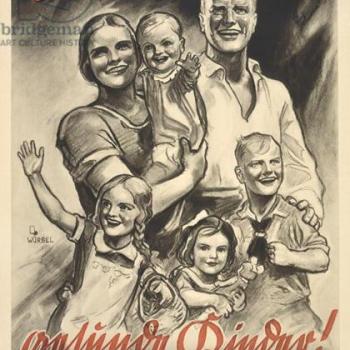When my brothers were about ten or twelve, my parents began to say that they were “chafing at being under the authority of a woman.” By this they meant that my brothers didn’t like having to obey my mom, because, of course, they were becoming men. And, well, men don’t like being under female authority. Or at least, that’s what they said. And to this day, if you asked my mother, she would tell you that all of her boys have “chafed under her authority” while none of her girls have done so. She sees this as supporting her essentialist and patriarchal ideas about gender. But what my parents didn’t notice is how their ideas about gender differences in this area both shaped how they perceived the information they received from us and how we behaved.
First of all, it’s simply untrue that none of us girls ever “chafed” at having to obey my mother. We did, and some more than others. It’s just that when the boys did so, my mother filed it away as confirming the stereotype, and when we did so, that was seen as just an individual aberration and the stereotype was not invoked. My mother was creating a pattern in her own mind based on her own preconceptions.
Second is the fact that the boys knew they were supposed to be chafing under female authority. How did they know this? Because my parents told them they were supposed to be. Really. In fact, any time one of my brothers pushed back against one of my mom’s rules, whether in a big way or in a small way, the fact that they were becoming men and that it was natural for them to chafe under my mom’s authority was brought up by my parents once again. It was actually talked about rather frequently beginning when my brothers were only ten or twelve.
Third, my brothers used the fact that my parents were expecting them to chafe under my mother’s authority to their advantage. They knew that they could get away with a lot more than we girls did, and justify it as their male parts not liking to obey mom’s rules. And indeed, when they were particularly obstinate, they were affirmed for it. And in fact, they were given accommodations, because their obstinance was only natural! They were becoming men, after all. We girls were given no such accommodations.
It occurs to me that this happens all the time out in what we used to call “the real world” too. Girls are expected, for instance, to be more nurturing and boys to be more aggressive. Well guess what? First, when girls are nurturing that gets filed away as a confirmation of the stereotype, and when boys are nurturing that’s seen as just an individual aberration. Second, boys and girls know that boys are supposed to be more aggressive and girls are supposed to be more nurturing. And third and finally, boys and girls learn to use these stereotypes to their advantages. And this whole process is applied to a million different gender roles and magnified again and again and again.
It really can’t be emphasized enough that the expectation that my brothers would chafe against my mother’s authority while my sisters wouldn’t helped to create the very gender differences my parents argued were natural. When one of us girls disobeyed my mom, we got in trouble. When one of the boys disobeyed my mom, he was praised and affirmed for showing evidence that he was becoming a man. Beyond that actual experience was the sheer weight of palpable expectations. The boys knew they were supposed to be physically active, to not listen to women, and to be preparing to protect and provide for a family. We girls knew that we were to be kind and compassionate, to be quite spirited with gentle tongues, and to be preparing to cook, keep house, and raise children. I’m having trouble figuring out how to articulate the extent to which this mattered. It mattered. We felt it. These expectations pervaded our daily lives and even how we viewed ourselves.
It’s really not surprising that it took years for me to even start shaking off the pure weight of these messages. And I suppose, after the sheer amount of gender programming I received as a child, it’s only natural that I become immediately skeptical whenever someone suggests that a given gender difference may be biological.














